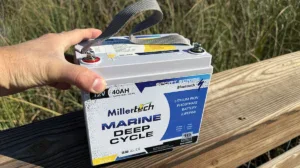Can you imagine walking along a shoreline and there’s just an endless train of baitfish, blue crabs and flounder huddled tightly together in inches of water, almost trying to escape their watery world? So close that you can bend over and touch them. Well, this exact scenario plays out during the summer months when conditions are right in Alabama’s Mobile Bay.
(Top image is courtesy of Explore Eastern Shore on Facebook.)
The Mobile Bay Jubilee Phenomenon
Mobile Bay jubilees are a fascinating and unique natural phenomenon not many fishermen outside of Alabama know about. They occur when a combination of factors — usually a lack of wind, high tides, and specific water temperatures — causes a decrease in oxygen levels near the bay’s bottom.
The time of year anglers are most likely to see jubilees occur during the warmer summer months, from June to September. When it happens, oxygen-depleted water forces bottom-dwelling fish, shrimp, and crabs to the surface and into shallow coastal waters.
For anglers, this is an incredible harvesting opportunity. The fish, disoriented and searching for oxygen, are easy to catch with dip nets or even by hand. The fish swim in mere inches of water, often along the bay’s eastern shorelines near Daphne or Fairhope. Besides baitfish, shrimp and crabs, one fish species that is particularly susceptible to jubilees are flounder. No surprise there, as flounder live on the sea floor and aren’t particularly great swimmers.
Dive Deep into the Science Behind Jubilees

So how does the parade of fish occur? NOAA Fisheries has studied the phenomenon well, able to define exactly why the event happens. Bottom-dwelling fish and crustaceans are driven to shore by hypoxic bottom waters. This occurs when salty, stagnant water collects at the bottom of Mobile Bay during calm summer conditions. The water then becomes stratified, or layered, with dense, salty water on the bottom and lighter, freshwater on top, which prevents oxygen from the air from mixing into the lower layers.
Water Temperature
Warmer water, which holds less oxygen, is a key factor in causing jubilees. Since Mobile Bay is shallow and its water temperature gets high in the summer, this is why these events only happen then.
Plankton
Plant plankton also plays an important role in occurrences of jubilees. A drastic increase in phytoplankton populations, caused by an abundance of nutrients from sources like animal waste and fertilizers, contributes to jubilees. At night, phytoplankton cannot perform photosynthesis and instead consume large amounts of dissolved oxygen. This consumption of oxygen by a massive phytoplankton population depletes the dissolved oxygen at the water’s surface.
Why the Eastern Shore of Mobile Bay?

Normally, oxygen-poor water stays at the bottom of Mobile Bay, but a slight easterly wind can create a current that moves surface water from the east (toward shore) to the west (away from shore). As a result, the incoming tide from the Gulf pushes the oxygen-poor bottom water in the other direction, toward the east.
Fish must evacuate the hypoxic zone to survive, but not all marine creatures can get away easily. Good swimmers simply swim over the top of the advancing low-oxygen zone, but the slower-paced benthic organisms, such as crabs, stingrays and flounder, must flee toward the shore in search of oxygen.
Don’t Get Greedy
Harvest regulations still apply during jubilees. It’s not an unlimited buffet for the taking. According to the Alabama Department of Conservation and Natural Resources (ADCNR), during jubilees, all daily creel limits and size limits remain in effect. For example, for flounder, the limit is five per person per day with a minimum size of 14 inches. That doesn’t change during a jubilee.
Are Jubilees a Sign of Environmental Trouble?
Jubilee events are known to occur regularly in two places: Mobile Bay, Alabama and Tokyo Bay, Japan. That’s just how rare this natural event actually is.
But nutrients are playing a part in jubilees. Nutrients are a natural part of the ecosystem, but an overabundance of them (think nitrogen and phosphorus) from human activities can exacerbate the conditions that lead to these events. The presence of excess nutrients makes the oxygen-poor water more severe, which in turn intensifies the jubilee phenomenon.
And hypoxic zones are never a good thing. Just think of it as “dead” water. Fish don’t want to be there. Anglers don’t want to fish in it. There’s little life in dead zones. The Gulf of Mexico also experiences its own dead zone each year.
How Do You Experience a Jubilee?
The key is to be ready and to watch for the signs — a glassy-smooth bay surface and the sudden appearance of fish near the shore, usually late at night or in the very early morning hours. Night time is prime time for jubilees to happen, so be on the look out for other anglers walking the shoreline with spotlights, castnets and flounder gigs. Rely on your network of fishing friends to get the word out. Word travels quickly when a jubilee is spotted. Just make sure you’re not exploring on someone’s private property; no one likes unexpected guests.
















